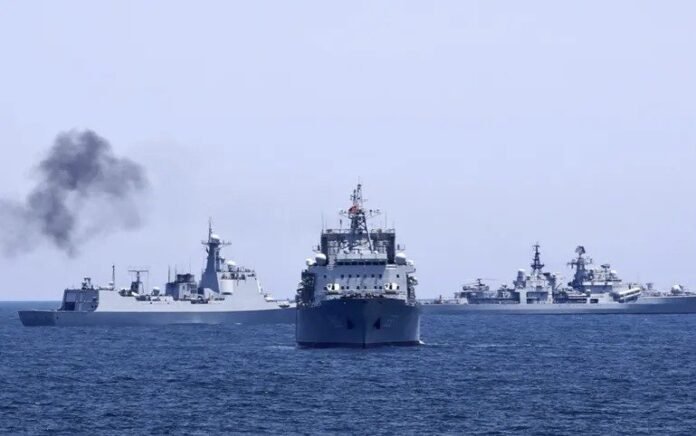Russia and China are staging mock combat drills and other war games in the Sea of Japan in a sign of strengthening military ties.
Though pre-planned, the joint naval exercises that began on Sunday came a day after Donald Trump moved US nuclear submarines closer to Russia in response to inflammatory comments from Russia’s former president Dmitry Medvedev.
The Joint Sea-2025 drills were launched in waters near to Vladivostok, Russia’s largest port on the Pacific Ocean, according to a statement from China’s Defence Ministry.
Four Chinese vessels, including guided-missile destroyers Shaoxing and Urumqi, will be participating in the three-day exercises.
This will include “submarine rescue, joint anti-submarine, air defence and anti-missile operations, and maritime combat”, followed by naval patrols in “relevant waters of the Pacific”.
Russia and China, which signed a “no-limits” strategic partnership shortly before Russia went to war in Ukraine in 2022, conduct regular military exercises to rehearse coordination between their armed forces and send a deterrent signal to adversaries.
Though Russia and China have both said that no third country is being targeted by their military cooperation, Japan has objected to the drills.
It said that greater strategic coordination between Beijing and Moscow poses a “strong concern” for its national security.

A warship from the Russian fleet fires missiles in a previous war game exercise – Russian Defence Ministry Press Service/via AP
Announcing the drills on Wednesday, Zhang Xiaogang, a spokesman for Beijing’s defence ministry, criticised US Air Force drills with Japan and others in the western Pacific.
“The US has been blindly flexing its muscles in the Asia-Pacific region and attempting to use military drills as a pretext to gang up, intimidate and pressure other countries, and undermine peace and stability in the region,” Zhang claimed.
China and Russia have held military exercises together for more than two decades, with ‘Joint Sea’ exercises beginning in 2012.
However, their cooperation, which was once sporadic, has deepened considerably over the past decade, with Vladimir Putin and Xi Jinping having met more than 40 times.
Mr Trump said his submarine order was made in response to what he called “highly provocative” remarks by Mr Medvedev about the risk of war between the nuclear-armed adversaries.
Russia and the United States have by far the biggest nuclear arsenals in the world. It is extremely rare for either country to discuss the deployment and location of its nuclear submarines.
